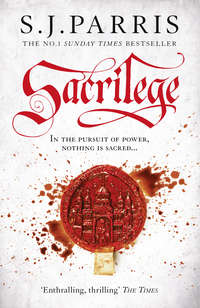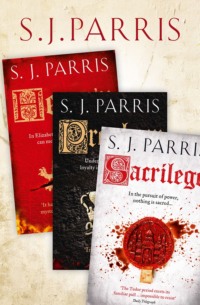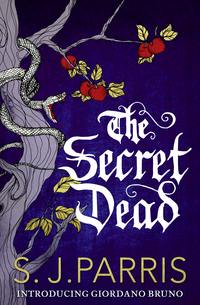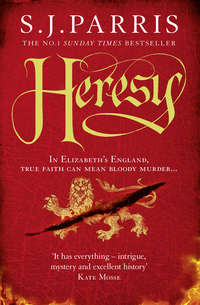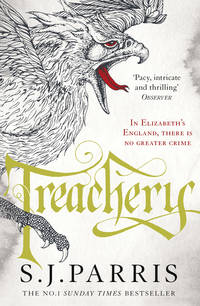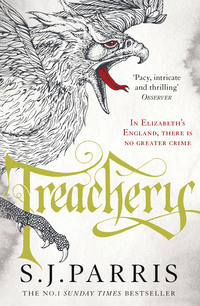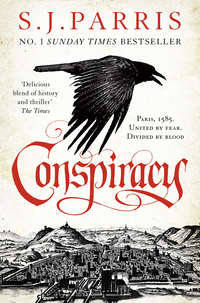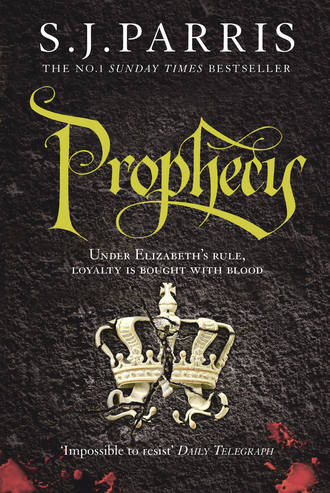
Полная версия
Prophecy
Outside, the night air is hard-edged with the first frost of autumn and the grounds are quiet, a welcome relief from the celebrations inside. In the knot-garden close to the house, lanterns have been lit and couples walk the neatly cultivated paths, murmuring, their heads close together. Even in the shadows, I can see that Sir Francis Walsingham is not to be found here. Stretching my arms, I strain my head back to gaze up at the sky, the constellations picked out in bright silver against the ink-blue of the heavens, their arrangement different here from the sky above Naples where I first learned the star-patterns as a boy.
I reach the end of the path and still there is no sign of him, so I set off across the open expanse of lawn, away from the lit paths, towards an area of woodland that borders the cultivated part of the garden at the back of Walsingham’s country house. As I walk, a lean shape gathers substance out of the shadows and falls into step beside me. He seems made of the night; I have never seen Walsingham wear any suit other than black, not even today, at his daughter’s wedding, and he wears still his close-fitting black velvet skullcap, that makes his face yet more severe. He is past fifty now and I have heard he has been ill this last month – one of the protracted bouts of illness that confines him to his bed for days at a time, though if you enquire after his health he swats the question away with a flick of his hand, as if he hasn’t the time to consider such trifles. This man, Queen Elizabeth Tudor’s Principal Secretary, though he may not seem an imposing figure at first glance, holds the security of England in his hands. Walsingham has created a network of spies and informers that stretches across Europe to the land of the Turks in the east and the colonies of the New World in the west, and the intelligence they bring him is the queen’s first line of defence against the myriad Catholic plots to take her life. More remarkably still, he seems to hold all this intelligence in his own mind, and can pluck any information he requires at will.
I had arrived in England six months earlier, at the beginning of spring, sent by my patron King Henri III of France to stay for a while with his ambassador in London in order to spare me the attentions of the Catholic extremists who were gathering support in Paris, led by the Duke of Guise. I had barely been in England a fortnight when Walsingham asked to meet me, my long-standing enmity with Rome and my privileged position as a house guest at the French embassy making me ideally suited to his purposes. Over the past months, Walsingham is a man I have grown to respect deeply and fear a little.
But his cheeks are hollowed out since I last saw him. He folds his hands now behind his back; the noise of the celebrations grows fainter as we move away from the house.
‘Congratulazioni, your honour.’
‘Grazie, Bruno. I trust you are making the most of the celebrations?’
When he converses alone with me, he speaks Italian, partly I think to put me at ease, and partly because he wants to be sure I do not miss any vital point – his diplomat’s Italian being superior to the English I learned largely from merchants and soldiers on my travels.
‘Out of curiosity – where did you learn our English dances?’ he adds, turning to me.
‘I largely make them up as I go along. I find if one steps out confidently enough, people will assume you know what you are doing.’
He laughs, that deep rolling bear-laugh that comes so rarely from his chest.
‘That is your motto in everything, is it not, Bruno? How else does a man rise from fugitive monk to personal tutor to the King of France? Speaking of France –’ he keeps his voice light – ‘how does your host, the ambassador?’
‘Castelnau is in good spirits now that his wife and daughter are newly returned from Paris.’
‘Hm. I have not met Madame de Castelnau. They say she is very beautiful. No wonder the old dog always looks so hearty.’
‘Beautiful, yes. I have not spoken to her at any length. I am told she is a most pious daughter of the Catholic Church.’
‘I hear the same. Then we must watch her influence over her husband.’ His eyes narrow. We have reached the trees, and he gestures for me to follow him into their shadows. ‘I had thought Michel de Castelnau shared the French king’s preference for diplomatic dealings with England – so he claims when he has audience with me, anyway. But lately that fanatic the Duke of Guise and his Catholic Leaguers are gaining strength in the French court, and in your letter last week you told me that Guise is sending money to Mary of Scotland through the French embassy –’ He pauses to master his anger, quietly striking his fist into the palm of his hand. ‘And what need has Mary Stuart of Guise money, him? She is more than generously provided for in Sheffield Castle, considering she is our prisoner.’
‘To secure the loyalty of her friends?’ I suggest. ‘To pay her couriers?’
‘Precisely, Bruno! All this summer I have laboured to bring the two queens to a point where they are prepared to hold talks face to face, perhaps negotiate a treaty. Queen Elizabeth would like nothing better than to give her cousin Mary her liberty, so long as she will renounce all claim to the English throne. For her part, I am led to believe that Mary tires of imprisonment and is ready to swear to anything. That is why this traffic of letters and gifts from her supporters in France through the embassy troubles me so deeply. Is she double-dealing with me?’
He glares at me as if he expects an answer, but before I can open my mouth, he continues, as if to himself:
‘And who are these couriers? I have the diplomatic packet intercepted and searched every week – she must have another means of delivery for her private letters.’ He shakes his head briskly. ‘While she lives, Mary Stuart is a banner to rally England’s Catholics, and all those in Europe who hope to see a papist monarch back on our throne. But Her Majesty will not move pre-emptively against her cousin, though the Privy Council urges her to see the danger. This is why your presence in the French embassy is more crucial to me than ever, Bruno. I need to see every communication between Mary and France that passes through Castelnau’s hands. If she is plotting against the queen’s sovereignty again, I must have hard evidence that incriminates her this time. Can you see to it?’
‘I have befriended the ambassador’s clerk, your honour. For the right price, he says he can give us access to every letter Castelnau writes and receives, if you will guarantee that the documents will bear no evidence of tampering. He is greatly afraid of being discovered – he craves assurances of your honour’s protection.’
‘Good man. Give him all the assurances he needs.’ He clasps my shoulder for a moment. ‘If he will obtain for us an example of the ambassador’s seal, I will set my man Thomas Phelippes to create a forgery. There is no man in England more skilled in the arts of interception. In the circumstances, Bruno, I do not think it prudent that you should be seen so much with Sidney,’ he adds. ‘Now that he is so publicly tied to me. Castelnau must not doubt your loyalty to France for a moment.’
Even through the dark, my face must betray my disappointment; Sidney is the only person I truly consider a friend in England. We had first met years ago in Padua, when I was fleeing through Italy, and renewed our friendship in the spring, when we had travelled to Oxford together on Walsingham’s business. The adventures we shared there had only served to bring us closer. Without his company, I will feel my state of exile all the more keenly.
‘But I have found you another contact. A Scotsman named William Fowler – you will meet him in due course. He is a lawyer who has worked for me in France, so you will have plenty to talk about.’
‘You would trust a lawyer, your honour?’
‘You look amused, Bruno. Lawyers, philosophers, priests, soldiers, merchants – there is no one I will not make use of. Fowler is well connected in Scotland, both among our friends and those loyal to the Scottish queen, who believe he is a friend to their cause. He has also insinuated himself with Castelnau, who believes Fowler to be a secret Catholic unhappy with Her Majesty’s government. He has the knack of making himself all things to all men if necessity demands. Fowler is well placed to convey your reports from inside the embassy without you compromising your position.’ He pauses and lifts his head; strains of music and laughter drift faintly towards the house and he seems to remember the occasion. ‘For now, this is all. Come – we should be merry today. You must rejoin the dance.’
We turn to face the lit windows across the lawn, his hand lightly on my back. Out here, so far from the City, clean night scents of earth, grass and frost carry to us on the breeze. Even the Thames, running its sluggish course beyond the line of the trees behind us, smells fresh here, so far to the west of London. We are only a mile from Dee’s house; I am surprised that he has not been invited. He is, after all, Sidney’s old tutor and a friend of sorts to Walsingham. As if reading my thoughts, the Principal Secretary says, casually.
‘You are spending a good deal of time in Mortlake lately, I hear?’ It is not really a question.
‘I am writing a book,’ I explain, as we begin to move slowly together in the direction of the music. ‘Doctor Dee’s library has been invaluable.’
‘What manner of book?’
‘Of philosophy. And cosmology.’
‘A defence of your beloved Copernicus, then.’
‘Something like that.’ I did not want to say too much about the book I was working on until it was completed. The ideas I was attempting to put forward were not just controversial but revolutionary, far beyond the theories that Copernicus had proposed. I wanted at least to have written it before I was obliged to defend it.
‘Hm.’ A heavy silence. ‘Be wary of John Dee, Bruno.’
‘I thought he was your honour’s friend?’
‘Up to a point. In matters of cartography, or ciphers, or the reformation of the calendar, there is no one in the kingdom whose knowledge I prize higher. But lately his talk runs much on prophecies and omens.’
‘He believes we are living in the end times.’
‘We are living in times of unprecedented turbulence, that much is certain,’ he replies brusquely. ‘But Her Majesty has enough to fear without Dee whispering these apocalyptic forecasts in her ear because he wants to make himself indispensable to her. As do we all, I suppose, in our way,’ he concedes, with a sigh. ‘But then his influence filters down even to the Privy Council chamber and suddenly she will not allow any decision without first consulting a star-chart. It makes the business of government very difficult. Besides,’ he lowers his voice, ‘it is my firm belief that Almighty God has written some secrets into the Book of Nature that are not supposed to be unlocked. From what I hear, Dee’s newest experiments come dangerously close to crossing that line.’
There is no point in asking how he knows of Dee’s experiments; Walsingham’s eyes and ears encompass all of Europe and even the colonies of the New World. It should be no surprise that he knows what goes on a mile from his own house. Yet Dee has been so scrupulous about secrecy where his scrying is concerned.
‘There are some at court who feel he has too much influence over Her Majesty, and must be removed from favour,’ Walsingham continues.
‘Your honour included?’
His teeth shine briefly in the dark as he smiles.
‘I have a great respect for John Dee, and I would not do anything to hurt his reputation. The same is not true of some others on Her Majesty’s Privy Council. Lord Henry Howard is publishing a book, I am told, to be presented to the queen – a fierce attack on prophecy and astrology and all those who claim to tell the future, calling them necromancers, accusing them of speaking with demons. He does not mention Dee by name, but the intent is clear enough . . . If Dee can be tainted for witchcraft, so much the worse for those of us known as his friends – me, Sidney, the Earl of Leicester. The Howards are dangerously powerful, and the queen knows this well enough. You may like to mention this to Dee the next time you are using his library.’
I incline my head to show that the warning is understood. As I bow and prepare to take my leave, I glance up to see a figure haring across the grass to us, a short riding cloak flapping behind him. He drops breathlessly to his knees at Walsingham’s feet, and even in the thin silvered light I can make out the royal ensign on his livery, beneath the spattering of mud that shows he has ridden hard to get here. He mutters something about Richmond, a matter of urgency; there is alarm in his bulging eyes. I step away discreetly so that he may deliver his news privately, but Walsingham calls me back.
‘Bruno! Wait for me a moment, will you?’
I stand a little way off, stamping my feet against the chill and rubbing my hands while the man rises to his feet and imparts his news in frantic bursts, Walsingham canted over to receive it, his hands still folded immobile behind his back. Whatever news this messenger has brought from the royal household must be serious indeed to interrupt a man’s family wedding feast.
At length, Walsingham murmurs a response, the messenger bows and departs in the direction of the house with the same haste. Walsingham raises his hand to beckon me over.
‘I am needed at Richmond Palace on a most grave matter, Bruno, and I want you with me. It will be preferable to disturbing the celebrations. We must leave quietly, without attracting attention – that fellow is gone to instruct the servants to make a boat ready. I will tell you as much as I know while we travel.’ His voice is tight but controlled; if something distressing has befallen Her Majesty, Walsingham is the man she relies upon to bring order, discipline, calm.
‘Will you not be missed?’ I gesture in the direction of the wedding feast. He laughs, briefly.
‘So long as I leave my steward in charge with the keys to the wine cellar, I doubt anyone will notice. Come, now.’
He leads me around the back of the house and through the garden to the little wharf where lights are bobbing gently, reflected in the black water. I must wait for him to tell the messenger’s tale in his own time.
Chapter Two
Richmond Palace, south-west London 21st September, Year of Our Lord 1583
‘A violent death, the fellow said.’ Walsingham has to raise his voice over the rhythm of the oars as the servant doggedly ploughs the small craft westward against the tide. The wind blows the spray sideways into our faces. In daylight we could ride the distance from Barn Elms to Richmond Palace in half the time, covering the ground as the crow flies across the deer park, but in darkness the river is the surest way, though it loops its course lazily around the headland.
‘But of some special significance, for them to disturb your honour?’ The wind snatches my words away even as they leave my mouth.
‘One of Her Majesty’s maids of honour, apparently, killed within a stone’s throw of the queen’s own privy apartments, under the noses of the yeomen of the guard and the serjeants-at-arms – you may imagine the entire household is in an uproar. But it is the manner of this death that makes my lord Burghley summon me with such urgency. We will learn more anon.’
He sits back and points up as the white stone façade of the palace looms ahead, a pale shadow under the moon, its chapel and great hall rising to an imposing height either side of the gatehouse with its warmly lit windows. From the range that flanks the river, a forest of slender turrets rises against the clouds, all topped with gilded minarets, onion-shaped, like the palace of an eastern sultan. A servant is waiting for us at the landing stage behind the palace where a row of wooden barques are tethered, the water slapping idly at their sides; he welcomes the Principal Secretary with a bow, but his face is strained. Here, where the royal apartments face the river, he shows us to a little postern gate set into the wall. By the door stand two men, each holding a pikestaff, who move aside to let the servant pass. He bangs hard on this door and calls out; a small grille is slid open and a series of brusque, whispered exchanges follow before the door is opened wide and a short, round-faced man with feathery white hair under a black skullcap strides through, his arms outstretched, his face creased in a harried frown. He embraces Walsingham briefly, then catches sight of me and the anxiety in his drooping eyes intensifies.
‘This is . . .?’
Walsingham lays a hand on his arm to placate him.
‘Giordano Bruno. A most loyal servant of Her Majesty,’ he adds, with a meaningful nod.
The older man considers me for a moment, then a light of recognition steals over his face.
‘Ah. Your Italian, Francis? The renegade monk?’
I incline my head in acknowledgement; it is not a compliment, though it is a title I wear with some pride.
‘So the Roman Inquisition likes to call me.’
‘Doctor Bruno is a philosopher, William,’ Walsingham gently corrects.
The older man reaches out a hand to me.
‘William Cecil, Lord Burghley. Francis has spoken highly of your talents, Doctor Bruno. You served Her Majesty well in Oxford this spring, I understand.’
I feel my chest swell and my face flush at this; Walsingham is miserly with his praise to your face, which makes you strive for it all the more, yet he has talked about me favourably to Lord Burghley, the queen’s High Treasurer, one of her most influential advisors. You fool, I chide myself, smiling; you are thirty-five years of age, not a schoolboy praised for his penmanship, though this is exactly how I feel. I continue to beam to myself even as Burghley’s face turns sombre again.
‘This way, gentlemen. Let us not waste time.’
Inside the palace, the air seems stiff with fear. Faces, half-hidden, peer anxiously out of doorways as our footsteps echo along wood-panelled corridors lit by candles whose flames waver in the disturbance we make, sending our shadows looming and shrinking along the walls as Walsingham and I follow Burghley’s purposeful strides.
‘I almost forgot, Francis,’ he says, over his shoulder, ‘how was the wedding?’
‘Well enough, I thank you. I have left the party in full spate. Heaven only knows what will be left of my house when Sidney’s young bloods have finished their roistering.’
‘I am sorry, truly, to draw you away,’ Burghley replies, lowering his voice. ‘If the circumstances were not so very . . . well, you shall see. Her Majesty asked for you in person, Francis.’ He hesitates. ‘Well – to be honest, she called first for Leicester. But I thought the earl, after a day at his nephew’s wedding feast . . .’
Walsingham nods.
‘I thought you were the man to take charge, Francis. The queen is rightly afraid. This thing has happened within her own walls and its implications . . .’ The words die on his lips.
‘Understood. Show me this deed, William, then take me to the queen.’
He brings us up two flights of stairs where the panels are painted in scarlet, green and gold tracery, then along a more richly furnished and considerably warmer corridor, hung with tapestries and damask cloths; I guess we are nearing the site of the queen’s private apartments. On the way we pass three more armed men in royal livery. Burghley pauses outside a low wooden door where a stout man stands guard, a sword at his belt. The Lord Treasurer nods to him, and he steps back; Burghley rests his hand on the latch and his shoulders twitch.
‘Your discretion, gentlemen.’
The door swings open and I follow Walsingham through into a small chamber, well lit by good wax candles, where a body lies in repose on a bed whose curtains have been drawn back. At first I think it is a young man; the breeches and shirt are a man’s certainly, but as we step closer I see the long fair hair spread over the pillow, threads of gold glinting in the candlelight. Her motionless face is swollen and purple, with the popping eyes and bulging tongue that tell of strangulation. The white linen shirt she wears has been ripped down the front, though the two halves have been arranged to preserve her modesty, even in death. She looks young, no more than sixteen or seventeen; her slender neck is ringed with dark bruises and ugly welts and her breeches are torn, the silk stockings muddied and snagged. I glance from one to the other of my companions and understand with a jolt that I am flanked by the two highest officials of the queen’s Privy Council. This is no ordinary death.
Walsingham pauses for a moment, perhaps out of respect, then walks around the bed, examining the body dispassionately, as if he were her physician.
‘Who is she?’
‘Cecily Ashe,’ Burghley says. He has closed the door behind us and stands by it, twisting his hands together; perhaps he feels we are committing an impropriety, three men gathered to stare at the barely cold body of a young woman. ‘One of Her Majesty’s maids of honour, under the care of Lady Seaton. Her Majesty’s Lady of the Bedchamber,’ he adds, for my benefit.
‘Ah.’ Walsingham nods, and clasps his hand across his chin, obscuring his mouth. I have noticed that he does this when he does not wish to betray any emotion. ‘Ashe . . . Then she would be the elder daughter of Sir Christopher Ashe of Nottingham, would she not? Poor child – she has not been at court even a year. The same age as my Frances.’
We all stand silent for a moment, all our thoughts following Walsingham’s to his seventeen-year-old daughter, the new bride who, perhaps even now, is being led to the marital bed by Sir Philip Sidney, a man eleven years her senior and with notoriously vigorous appetites.
‘Almost the same age as my Elizabeth was when she died,’ Burghley adds softly. Walsingham glances at him; there is a moment of unspoken sympathy as their eyes meet and I sense that these two men share an understanding deeper than politics.
‘The clothes?’
‘Ah, yes.’ Burghley shakes his head. ‘The usual trouble, I suspect. Trying to steal out undetected to a tryst with someone she should not.’ He makes it sound as if this is a common problem.
‘Has she been violated?’
Walsingham’s tone is brisk again; Burghley gives a little cough.
‘She has not yet been officially examined by the physician, but the body was found with the breeches and underclothes torn, the shirt ripped apart likewise. There are bruises and bloody marks on her thighs. She was laid out in the form of a crucifix, with her arms outstretched. There is something else you should see.’ Taking a deep breath, he crosses to the body and, taking one corner of the torn material gingerly between his forefinger and thumb as if it might scald him, he folds down the left side of the shirt to expose the girl’s small, pale breast.
Walsingham and I both gasp simultaneously; there is a mark cut into the soft white flesh, over her still heart. The lines have been traced into the skin carefully and the blood blotted away, so that the mark stands out in jagged crimson lines, a shape that looks like a curved figure 2 with a vertical line bisecting its tail. This mark is unmistakably the astrological symbol for the planet Jupiter. He shoots me a questioning look, swift as blinking, but Burghley’s sharp eye notes it.
‘That is not all,’ says the Lord Treasurer, as he covers the girl again. ‘In each of her outstretched hands she held these objects.’ From the wooden dresser beside the bed he holds up a rosary of dark wood adorned with a gold Spanish cross, and with the other hand he presents Walsingham with a small wax effigy, about the size of a child’s doll.
‘Dear God,’ Walsingham breathes, holding up the figurine for me to see. It is crudely made, but unquestionably an imitation of Queen Elizabeth; red wool for hair, a cloak fashioned from a scrap of purple silk, a paper crown on its head, a sewing needle protruding from its breast, where it has been stabbed through the heart. We both look at Burghley, who nods, once. No ordinary murder indeed.


